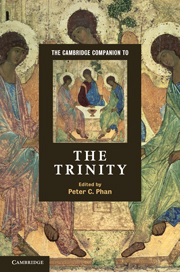Book contents
- Frontmatter
- Contents
- Notes on contributors
- Preface
- Part I Introduction
- Part II Retrieving the sources
- Part III Renewing the tradition
- Part IV Contemporary theologians
- Part V In dialogue with other religions
- 17 The Tao in Confucianism and Taoism: the Trinity in East Asian perspective
- 18 Trinity and Hinduism
- 19 Primordial Vow: reflections on the Holy Trinity in light of dialogue with Pure Land Buddhism
- 20 Trinity in Judaism and Islam
- Part VI Systematic connections
- Index
- References
18 - Trinity and Hinduism
from Part V - In dialogue with other religions
Published online by Cambridge University Press: 28 July 2011
- Frontmatter
- Contents
- Notes on contributors
- Preface
- Part I Introduction
- Part II Retrieving the sources
- Part III Renewing the tradition
- Part IV Contemporary theologians
- Part V In dialogue with other religions
- 17 The Tao in Confucianism and Taoism: the Trinity in East Asian perspective
- 18 Trinity and Hinduism
- 19 Primordial Vow: reflections on the Holy Trinity in light of dialogue with Pure Land Buddhism
- 20 Trinity in Judaism and Islam
- Part VI Systematic connections
- Index
- References
Summary
This chapter shares the recognition presupposed in this volume of the Trinity's place at the core of Christian reflection on a very wide range of topics of theological and spiritual import. It is no surprise that Christians consider world religions, in general and also in their particular forms, in light of the reality and theology of Trinity, and we can expect that trinitarian theology will inform how we construct Christian theology, even in its interreligious form. What is true in general remains pertinent in particular cases, among which Hindu traditions (henceforth “Hinduism”) are a particularly interesting case. Given the specific nature of the Hindu–Christian relationship – long and varied, surprising in its instances of common ground, yet far less foundational or developed than Christian relations with Judaism and Islam – reflection on the Trinity in relation to Hinduism enables us to see the possibilities and drawbacks of using a trinitarian hermeneutic in encounter with a tradition so interestingly like yet unlike the Christian. In this brief chapter, I explore some older Christian uses of trinitarian imagery in understanding and judging Hinduism, Hindu reactions to and appropriations of the Trinity, the contemporary use of trinitarian theology with particular reference to Hinduism, and the larger problem of the reality and theology of Trinity in Hinduism. Given the breadth of possibilities, I limit my reflections to topics that highlight the trinitarian dimension, thus forgoing topics such as creation, incarnation, and inspiration that in other contexts would naturally be considered from a trinitarian perspective.
- Type
- Chapter
- Information
- The Cambridge Companion to the Trinity , pp. 309 - 324Publisher: Cambridge University PressPrint publication year: 2011



